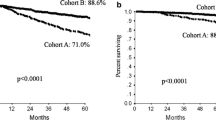Abstract
Purpose
Though advanced and metastatic epidermal growth factor receptor 2 (HER2)-positive disease is not curable, a small proportion of patients with HER2-positive metastatic breast cancer remain in prolonged complete remission with anti-HER2 treatment. We hypothesized that some cases of HER2-positive metastatic breast cancer may be curable. In this large, multicenter retrospective study, we aimed to assess the long-term outcomes for patients with a durable response to trastuzumab.
Methods
We retrospectively evaluated the data of patients diagnosed with HER2-positive metastatic breast cancer who received trastuzumab for more than 2 years as the first-line treatment. Patients diagnosed between April 1, 2001 and December 31, 2014 at 19 institutions in Japan were included in the analysis. From 124 potential subjects, 16 were excluded and 108 were evaluated.
Results
The median follow-up length was 7.7 years. Disease progression occurred in 44/108 (40.7%) patients and 13/108 (12%) patients died. The median progression-free survival was 11.2 years, and as more than 80% of patients were alive 10 years after metastatic breast cancer diagnosis. Of the 108 patients, 57 achieved a clinical complete response. Trastuzumab therapy was interrupted for 27 (47.4%) of these patients (based on the doctor’s recommendation for 19 patients, owing to adverse events for 4 patients, owing to unknown reasons for 3 patients, and at the request of 1 patient). Disease progression occurred in 4 of the 27 patients after the interruption of trastuzumab treatment. The median duration of trastuzumab therapy for all 27 patients was 5.1 years (0.9–9.3 years).
Conclusion
We found that some patients showed no evidence of disease after the interruption of trastuzumab therapy. Discontinuation of maintenance trastuzumab in this patient population after a limited time should be explored cautiously while awaiting a global collaborative effort for a randomized trial.



Similar content being viewed by others
References
Iwamoto T, Fukui N, Kinoshita T et al (2015) Comprehensive prognostic report of the Japanese Breast Cancer Society registry in 2006. Breast Cancer 23(1):62–72
Cardoso F, Fallowfield L, Costa A et al (2011) Locally recurrent or metastatic breast cancer: ESMO Clinical Practice Guidelines for diagnosis, treatment and follow-up. Ann Oncol 22(Suppl 6):vi25–vi30
Giordano SH, Temin S, Kirshner JJ et al (2014) Systemic therapy for patients with advanced human epidermal growth factor receptor 2-positive breast cancer: American Society of Clinical Oncology clinical practice guideline. J Clin Oncol 32:2078–2099
Harano K, Lei X, Gonzalez-Angulo AM et al (2016) Clinicopathological and surgical factors associated with long-term survival in patients with HER2-positive metastatic breast cancer. Breast Cancer Res Treat 159:367–374
Yardley DA, Tripathy D, Brufsky AM et al (2014) Long-term survivor characteristics in HER2-positive metastatic breast cancer from registHER. Br J Cancer 110:2756–2764
Swain SM, Baselga J, Kim SB et al (2015) Pertuzumab, trastuzumab, and docetaxel in HER2-positive metastatic breast cancer. N Engl J Med 372:724–734
Witzel I, Muller V, Abenhardt W et al (2014) Long-term tumor remission under trastuzumab treatment for HER2 positive metastatic breast cancer—results from the HER-OS patient registry. BMC Cancer 14:806
Beda M, Basso U, Ghiotto C, Monfardini S (2007) When should trastuzumab be stopped after achieving complete response in HER2-positive metastatic breast cancer patients? Tumori 93:491–492
The World Health Organization (1983) Histological typing of breast tumors. Neoplasma 30:113–123
Tripathy D, Kaufman PA, Brufsky AM et al (2013) First-line treatment patterns and clinical outcomes in patients with HER2-positive and hormone receptor-positive metastatic breast cancer from registHER. Oncologist 18:501–510
Clavarezza M, Puntoni M, Gennari A et al (2016) Dual block with lapatinib and trastuzumab versus single-agent trastuzumab combined with chemotherapy as neoadjuvant treatment of HER2-positive breast cancer: a meta-analysis of randomized trials. Clin Cancer Res 22:4594–4603
Gullo G, Zuradelli M, Sclafani F et al (2012) Durable complete response following chemotherapy and trastuzumab for metastatic HER2-positive breast cancer. Ann Oncol 23:2204–2205
Haq R, Gulasingam P (2016) Duration of trastuzumab in patients with HER2-positive metastatic breast cancer in prolonged remission. Curr Oncol 23:91–95
Slamon DJ, Leyland-Jones B, Shak S et al (2001) Use of chemotherapy plus a monoclonal antibody against HER2 for metastatic breast cancer that overexpresses HER2. N Engl J Med 344:783–792
von Minckwitz G, du Bois A, Schmidt M et al (2009) Trastuzumab beyond progression in human epidermal growth factor receptor 2-positive advanced breast cancer: a german breast group 26/breast international group 03-05 study. J Clin Oncol 27:1999–2006
Tripathy D, Slamon DJ, Cobleigh M et al (2004) Safety of treatment of metastatic breast cancer with trastuzumab beyond disease progression. J Clin Oncol 22:1063–1070
Acknowledgements
We would like to thank the following individuals for providing us with data on patients: Nobusuke Sasada; Hiroshima University Hospital, Mayumi Ishida; National Kyushu Cancer Center, Fukuoka, Japan, Keisei Anan; Kitakyushu Municipal Medical Center; Yasuyuki Kojima, St Marianna University School of Medicine, Hideaki Shigematsu; National Hospital Organization Kure Medical Center; and Hideaki Komatsu, Iwate Medical University School of Medicine. We would also like to thank Editage for providing editorial assistance.
Funding
This research is partially supported by the Practical Research for Innovative Cancer Control (15ck0106049h0002, 17ck0106307h0001) from the Japan Agency for Medical Research and Development, AMED, National Cancer Center Research and Development Fund (26-A-4).
Disclosure
Shigehira Saji received a research grant from Chugai Pharmaceutical Co. Ltd. Yutaka Tokuda received a research grant from Chugai Pharmaceutical Co., Ltd, Eisai Co. Ltd, and Novartis Pharma L.K. Hiroji Iwata holds honorarium in Chugai Pharmaceutical Co. Ltd. Norikazu Masuda holds honoraria in Chugai Pharmaceutical Co. Ltd and AstraZeneca. The other authors have declared no conflicts of interest.
Author information
Authors and Affiliations
Corresponding author
Rights and permissions
About this article
Cite this article
Niikura, N., Shimomura, A., Fukatsu, Y. et al. Durable complete response in HER2-positive breast cancer: a multicenter retrospective analysis. Breast Cancer Res Treat 167, 81–87 (2018). https://doi.org/10.1007/s10549-017-4489-9
Received:
Accepted:
Published:
Issue Date:
DOI: https://doi.org/10.1007/s10549-017-4489-9




